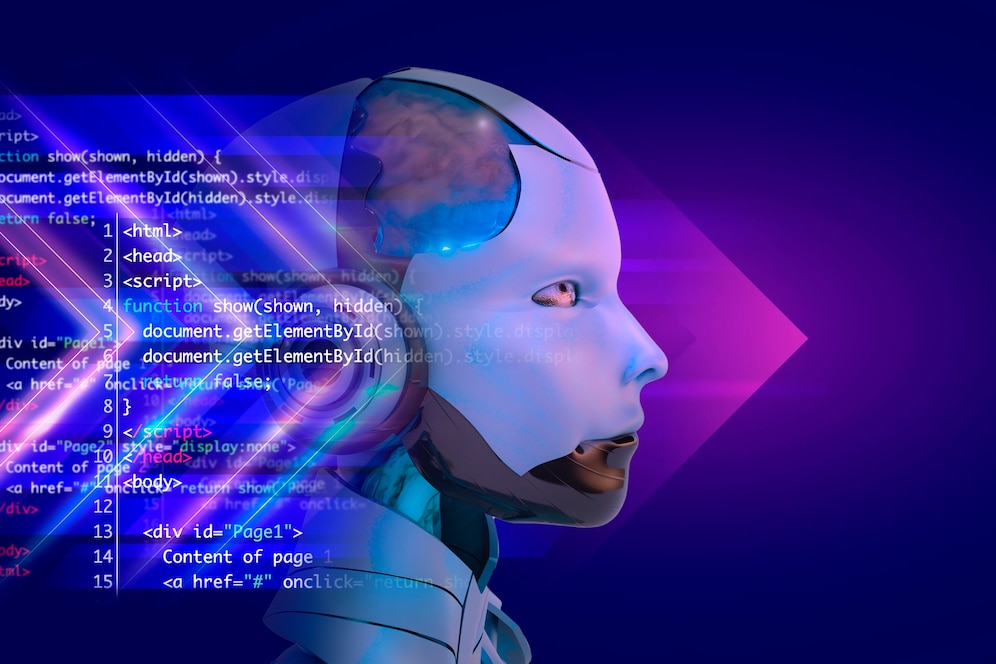Published
1 year agoon

Artificial Intelligence (AI) has been making waves across industries for its potential to revolutionize the way we live and work and it’s no longer just a buzzword.
More than half of the world’s population now uses code-driven systems, which present both extraordinary potential and challenges that have never been seen before. AI technology has already shown its ability to perform tasks that were once the exclusive domain of humans.
It can process vast amounts of data in a fraction of the time that it would take a human, make complex decisions, and even learn from experience. However, as AI becomes more advanced and capable, there are growing concerns that it could overtake human credibility. Let’s explore the future of AI and what it could mean for our society.
AI Transforming industries through powered analytics
To begin with, it’s important to note that AI is already making significant strides in many industries. From healthcare and finance to transportation and manufacturing, AI is being used to improve efficiency, reduce costs, and enhance decision-making.
AI technology is having a significant impact on the healthcare industry. AI-powered diagnostic tools can also help doctors identify diseases earlier, which can improve patient outcomes and reduce healthcare costs. Currently, AI uptake in the industry is limited due to a lack of trust between doctors and patients, heterogeneous data and misaligned incentives, the researchers said. According to a new report from McKinsey and Harvard researchers, AI could save the U.S. up to $360 billion annually if adopted more widely in healthcare.
Likewise, Chatbots are becoming increasingly popular, and many companies are using them to handle customer inquiries and support. These bots can provide fast and efficient responses to customer queries, and they never tire or become frustrated. However, some customers prefer to speak to a human, and there are concerns that AI-powered customer service could lead to a decline in the quality of customer service.
AI technology is also being used in the legal industry, where it can help with tasks such as document review and legal research. This technology can analyze vast amounts of legal data and identify patterns that would be difficult for a human to detect. However, there are concerns that AI technology could eventually replace lawyers, which could have significant implications for the legal profession.
As AI becomes more sophisticated, there are concerns that it could surpass human intelligence and decision-making capabilities. Some experts predict that AI could eventually become so advanced that it could make decisions on its own, without human intervention. This raises questions about accountability and responsibility – if something goes wrong, who is to blame?
Another concern is the impact that AI could have on the job market. As AI becomes more capable, it could potentially replace human workers in a number of industries. This could lead to significant job losses, particularly in sectors such as manufacturing, where robots are already being used to perform tasks that were previously done by humans.
Despite these concerns, we know the many potential benefits to AI. Ultimately, the future of AI will depend on how we choose to use it. If we take a responsible and ethical approach, we can harness the power of AI to improve our lives and create a more equitable society. However, if we let AI run unchecked, there could be serious consequences.
Is AI replacing humans?
The answer to this hot-topic question is not clear-cut. While AI is certainly becoming more advanced and capable, it still lacks the creativity, empathy, and judgment of human beings. There are also limitations to what AI can do – it cannot replicate the complexity of human emotions or the nuances of human interaction.
That being said, AI is rapidly evolving, and it’s likely that we’ll see significant advances in the coming years. This means that we need to be proactive in addressing the potential risks and challenges posed by AI, while also embracing its potential to improve our lives.
One way to do this is through increased regulation and oversight of AI. Governments and industry leaders need to work together to establish clear ethical guidelines and standards for the development and use of AI. This will help ensure that AI is used in a responsible and ethical manner, and that its potential benefits are realised.
Another way to address the challenges of AI is through education and training. As AI becomes more prevalent, we need to ensure that people have the skills and knowledge to work alongside it. This includes not just technical skills, but also the ability to think critically and creatively, to collaborate with others, and to adapt to change.
In conclusion, the future of AI is both exciting and uncertain. While there are concerns about its potential to overtake human credibility, there are also many opportunities to harness its power for good. Despite the fact that it can perform enormous tasks and has sufficient proficiency, AI lacks human emotional characteristics, so it can’t outrun humans in the future.


Paris 2024 Olympics: 5 of the most stylish uniforms on show


FM showers special love on Bihar and Andhra Pradesh in Budget 2024, as Opposition leaders cry “Kursi Bachao”


DreameIndia Appoints Manu Sharma as Managing Director to lead its India Operations and Market Expansion


Amazon eyes Swiggy Instamart to boost Quick Commerce in India


Economic Survey urges creation of 78.51 Lakh non-farm jobs annually


Explained: The significance of Savan in India

